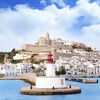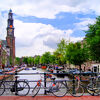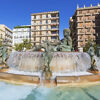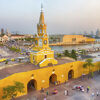14 Nights | Europe
You will visit the following 11 places:

Gibraltar
Gibraltar is a British Overseas Territory on the south coast of Spain known for the Rock of Gibraltar (a major landmark of the region), a 426m limestone ridge at its centre. It is a very unique place for the curious traveller. You can take the time to explore the caves and tunnels. The inside of the rock is an absolute labyrinth with secret internal roads and tunnels four times longer than those on the surface. Military presence and security in this otherwise deserted area is strong but almost invisible. Also, at the Apes' Den (Queen's Gate) and in the area of the Great Siege Tunnels there is the rare opportunity to see semi-wild primates at close quarters. If you let them, the monkeys will be their captivating selves and behave in their everyday natural manner.

Copenhagen
Copenhagen is the capital and largest city of Denmark. This "friendly old girl of a town" is big enough to be a metropolis with shopping, culture and nightlife par excellence, yet still small enough to be intimate, safe and easy to navigate. Overlooking the Øresund strait with Sweden just minutes away, it is a cultural and geographic link between mainland Europe and Scandinavia. This is where old fairy tales blend with flashy new architecture and world-class design; where warm jazz mixes with cold electronica from Copenhagen's basements. You'll feel you've seen it all in a day, but could keep on discovering more for months. Copenhagen is considered a very liveable place because of its cleanliness. It’s considered as one of the very environmentally friendly cities because its harbour can be swum in and about a third of the city’s people use bicycles as their means of transportation. In their downtown area, the places to visit and to be entertained at are the Tivoli gardens and the Town Hall Square. If you want the very cultural and scenic areas the places to see are the Marble church, the Rosenborg castle, and the Christiansborg.

Bilbao
Bilbao is a municipality and city in Spain, a major city in the province of Biscay in the autonomous community of the Basque Country. It is the main urban area in what is defined as the Greater Basque region. Situated in the north-central part of Spain, its main urban core is surrounded by two small mountain ranges. After its foundation in the early 14th century by Diego López V de Haro, head of the powerful Haro family, the city was a commercial hub of the Basque Country that enjoyed significant importance in Green Spain. This was due to its port activity based on the export of iron extracted from the Biscayan quarries. Throughout the nineteenth century and the beginning of the twentieth, Bilbao experienced heavy industrialisation, making it the centre of the second-most industrialised region of Spain. Today, Bilbao is a vigorous service city that is experiencing an ongoing social, economic, and aesthetic revitalisation process, started by the iconic Bilbao Guggenheim Museum, and continued by infrastructure investments, such as the airport terminal, the rapid transit system, the tram line, the Alhóndiga, and the currently under development Abandoibarra and Zorrozaurre renewal projects. Bilbao is also home to football club Athletic Club de Bilbao, a significant symbol for Basque nationalism due to its promotion of Basque players and one of the most successful clubs in Spanish football history.

Ibiza Town
Ibiza (or Eivissa) is a Spanish island in the Mediterranean Sea 79 km off the coast of the city of Valencia in Spain. It is the third largest of the Balearic Islands, an autonomous community of Spain. With Formentera, it is one of the two Pine Islands or Pityuses. Its largest cities are Ibiza Town (a popular stop for many tourists and now a UNESCO World Heritage Site), Santa Eulària des Riu and Sant Antoni de Portmany. It's well-known for the lively nightlife scene in Ibiza Town and Sant Antoni, where major European nightclubs have summer outposts. Well-known nightclubs are Privilege, Amnesia, Space, Pacha, Es Paradís and DC10.

The Convent Amsterdam
Amsterdam is the capital of the Kingdom of the Netherlands. It is the country's largest city and its financial, cultural, and creative centre. Many large Dutch institutions have their headquarters there, and seven of the world's 500 largest companies, including Philips and ING, are based in the city. In 2012, Amsterdam was ranked the second best city in which to live by the Economist Intelligence Unit (EIU) and 12th globally on quality of living for environment and infrastructure by Mercer. Amsterdam derives its name from the city’s origin as “Dam” of river “Amstel”. In the past, the name was "Amstelredamme" which later changed as “Amsterdam”. The city is one of the most popular destinations in Europe, attracting over 7 million international travellers annually. The city is colloquially known as ''Venice of the North'' because of its lovely canals that criss-cross the city, its impressive architecture and more than 1,500 bridges. There is something for every traveller's taste here; whether you prefer culture and history, serious partying, or just the relaxing charm of an old European city!

Lisbon
The capital of Portugal, Lisbon (Portuguese: Lisboa) has experienced a renaissance in recent years, with a contemporary culture that is alive and thriving and making its mark in today's Europe. Perched on the edge of the Atlantic Ocean, Lisbon is one of the rare Western European cities that faces the ocean and uses water as an element that defines the city. Lisbon enchants travellers with its white-bleached limestone buildings, intimate alleyways, and an easy-going charm that makes it a popular year-round destination.

Porto
Porto (also known as Oporto in English), is the second largest city in Portugal after Lisbon and one of the major urban areas of the Iberian Peninsula. The urban area of Porto, which extends beyond the administrative limits of the city, has a population of 1.4 million (2011) in an area of 389 km2 (150 sq mi), making it the second-largest urban area in Portugal. Located along the Douro river estuary in Northern Portugal, Porto is one of the oldest European centres, and its historical core was proclaimed a World Heritage Site by UNESCO in 1996. The western part of its urban area extends to the coastline of the Atlantic Ocean. Its settlement dates back many centuries, when it was an outpost of the Roman Empire. One of Portugal's internationally famous exports, port wine, is named for Porto, since the metropolitan area, and in particular the caves of Vila Nova de Gaia, were responsible for the packaging, transport and export of the fortified wine. In 2014, Porto was elected The Best European Destination by the Best European Destinations Agency.

Barcelona
Barcelona – Spain's enchanting capital, second largest and most populous city. It is a huge city that vibrates with life, and there’s certainly not another city in the country to touch it for its sheer style, looks or energy. It is one of the world's leading tourist, economic, trade fair and cultural centers, and its influence in commerce, education, entertainment, media, fashion, science, and the arts all contribute to its status as one of the world's major global cities. Barcelona is home to masterpieces of many great architects – the most famous of which is Antoni Gaudí.

Valencia
Valencia is the most populous city of the Autonomous Community of Valencia and the third largest city in Spain, with a population of 809,267 in 2010. It is the 15th-most populous municipality in the European Union. It is integrated into an industrial area on the Costa del Azahar. Its historic centre is one of the largest in Spain, with approximately 169 hectares; this heritage of ancient monuments, views and cultural attractions makes Valencia one of the country's most popular tourist destinations!

Cartagena
Cartagena is Colombia's most famous tourist destination on the Caribbean coast. The city is renowned for its colonial and colourful architecture. With a tropical climate, the city is also a popular beach destination. The city was founded on June 1, 1533, and named after Cartagena, Spain, itself after the original Carthage in Tunisia. However, settlement in this region around Cartagena Bay by various indigenous people dates back to 4000 BC. During the colonial period Cartagena served a key role in administration and expansion of the Spanish empire. It was a center of political and economic activity due to the presence of royalty and wealthy viceroys. In 1984 Cartagena's colonial walled city and fortress were designated a UNESCO World Heritage Site.









